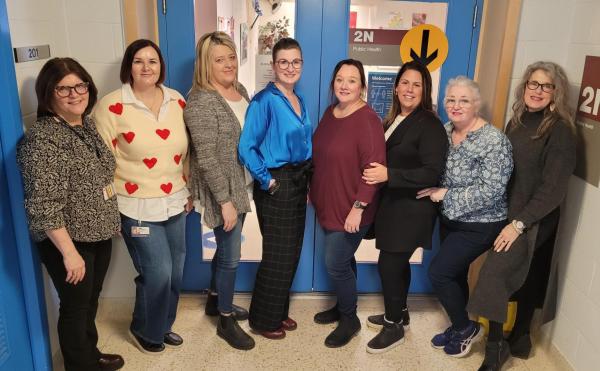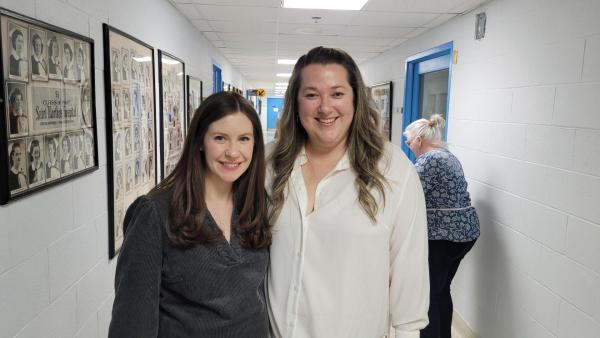Training for the Nurse-Family Partnership: a specialized curriculum for a unique nursing role

Early childhood development, including that which takes place before birth, has lifelong impacts on a person’s health and wellness. Helping parents provide the best possible start for their little ones is the goal of Public Health. Public Health’s Early Years team offers a range of support and services to pregnant people and parents with infants and young children.
This winter, the Eastern Zone Early Years team will be launching a new service, the Nurse-Family Partnership (NFP) program. This is an evidence-based program that began more than 40 years ago and is now used in eight countries, including Canada in British Columbia and Ontario.
In the NFP program, a Public Health Nurse (PHN) is paired with clients who are first-time parents and could benefit from additional support. The partnership starts early in the pregnancy and continues until the child’s second birthday.
A team of Public Health Nurses are now undergoing training to deliver this home visiting program with the direction of trainer Victoria Iaboni, Early Years Consultant with Public Health’s Science and Systems Performance team. Victoria completed the NFP education in Ontario and is excited to share her learnings with Nova Scotia’s first cohort of NFP nurses.

Photo: NFP trainers Victoria Iaboni and Lindsay Croswell
“I feel the training really develops the nurses’ skills and confidence required to deliver NFP. While attending the training in Ontario, the other NFP nurses, supervisors and I had the opportunity to discuss, practice and apply all of our knowledge of the NFP program through group reflection and activities,” said Victoria, who will use the same training model in Eastern Zone.
The training is comprehensive, and covers subjects related to the history and evidence supporting the program, the foundational theories, client-centered principles of care, reflective practice and therapeutic communication skills, such as motivational interviewing. The principles of trauma and violence informed care are embedded throughout the learning and clinical service delivery.
“A lot of content was covered in the training, but the education was so purposeful and thoughtfully delivered,” said Victoria.
The education emphasizes the importance of the therapeutic relationship between the nurse and the client. Public Health Nurses practice from a client-centered approach to care, which focuses on the client’s strengths. At the core of NFP is autonomy, where it is understood that the client is the expert of their own life. While there is structured guidance that is introduced by the nurse to support positive child or client health outcomes, the support provided during the visits is primarily determined by client’s needs, or their “heart’s desire” for their family.
During Victoria’s time in Ontario, she accompanied NFP nurses on three client visits, including an initial meeting with a pregnant youth, a visit with a family and their three-month-old baby, and a check-in with a client and their 10-month-old. Through these visits, she was able to see the growth of the nurse/client relationship, and the progression of the clients’ confidence in a variety of areas.
“It was so nice to see the impact of the program and how the relationship between the client and the nurse begins from day one and continues to grow,” she said. “When I was shadowing the NFP nurses on their visits, it was really evident that the nurses were incorporating what they learned in training and practicing according to how the program was intended to be delivered.”
Lindsay Croswell, who led Victoria’s training, is the Ontario Nurse-Family Partnership Nursing Practice Lead. Ontario was the first province to adopt NFP in Canada and has since been joined by British Columbia and now Nova Scotia.
As part of her role, Lindsay coordinates and facilitates the NFP education for Public Health Nurses and supervisors across the province. She is joining Victoria in Eastern Zone to support the initial training sessions, sharing her wealth of experience and client-focused perspective with our team.
“It's an amazing opportunity to work to your full scope within Public Health. Through NFP we’re able to appropriately match services and interventions to clients’ needs and goals, and really concentrate on the potential of parents to be successful,” said Lindsay. “To me, that’s one of the biggest benefits that we've seen from the program, because it really does believe in the potential of people who have had overlapping challenges in their lives to achieve the goals they identify, and supports them with the evidence-based NFP framework.”
Lindsay’s experience provides not just the fundamentals of NFP training, but also the long-term view for what it means for families. Throughout their two-and-a-half-year partnership, the nurse collaborates with the client to build on their strengths and skills, so at the time of graduation from the NFP program, the client will move forward on their parenting journey with confidence and a strong sense of self-worth.
As Public Health’s NFP program begins to take shape, that long-term perspective is invaluable, because while some of the positive outcomes will be seen immediately, others will emerge over time. The program is designed to give PHNs the time, resources and support they need to be successful, including strong leadership from the Eastern Zone NFP Charge Nurses, Early Years leaders, and the national and international community of practice.
“As we prepare to implement the Nurse Family Partnership program here in the Eastern Zone, I feel fortunate that we’re part of a broader NFP community who we can reach out to for guidance as needed. I really appreciate that support,” said Victoria.
With NFP training happening in early 2024, Public Health is an important step closer to launching this program, which will be added to a suite of Early Years services in Eastern Zone, and will help Public Health offer the appropriate level of care to clients. People who are pregnant can be referred to the Public Health Early Years team by health care providers or community organizations, like Family Resource Centres. They can also self-refer by getting in touch with their local Public Health office.
For more information about Nurse-Family Partnership, visit www.nursefamilypartnership.org, or find Canadian-focused content at nursefamilypartnership.ca.
Top Photo: The first cohort of NFP nurses in Nova Scotia